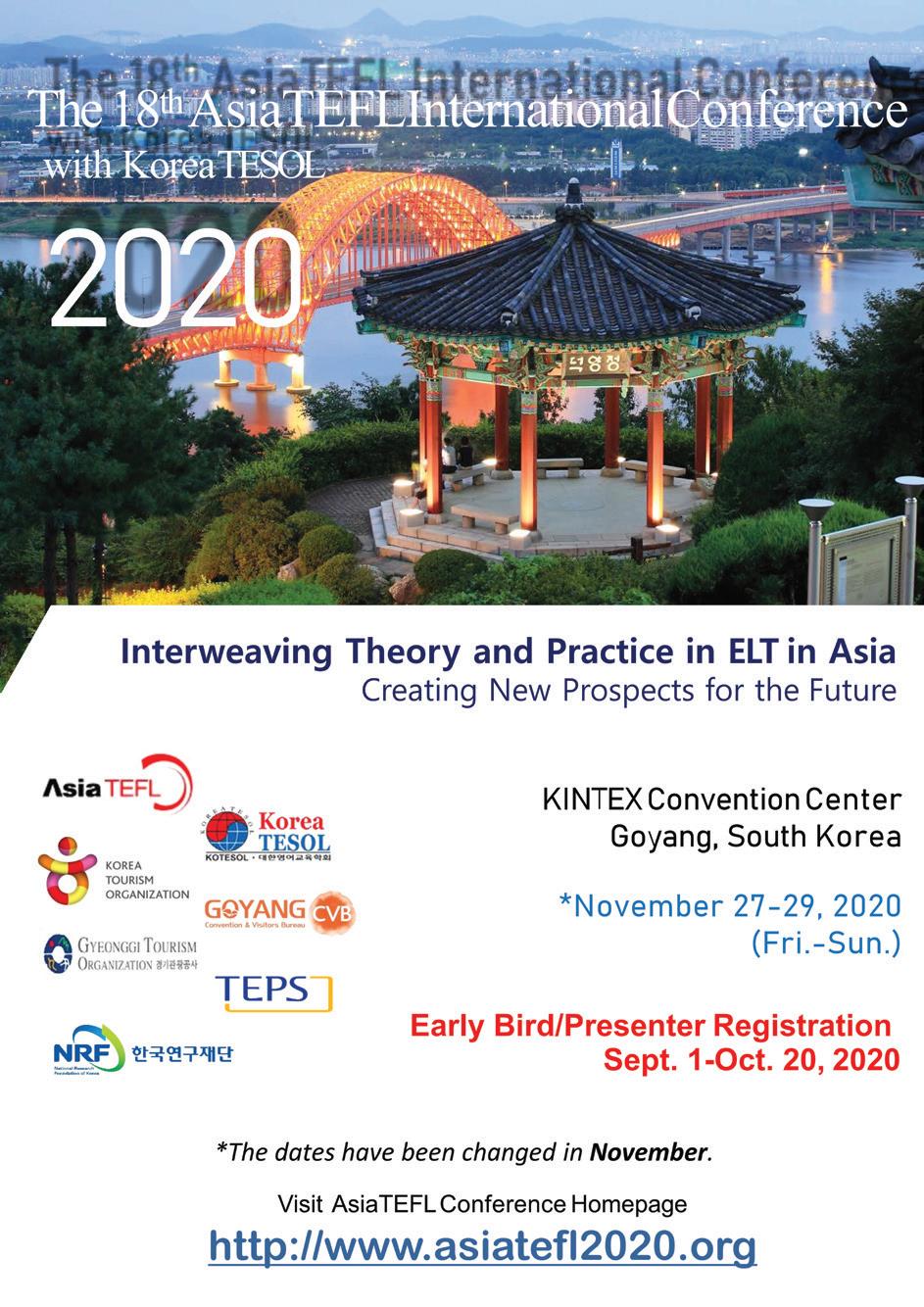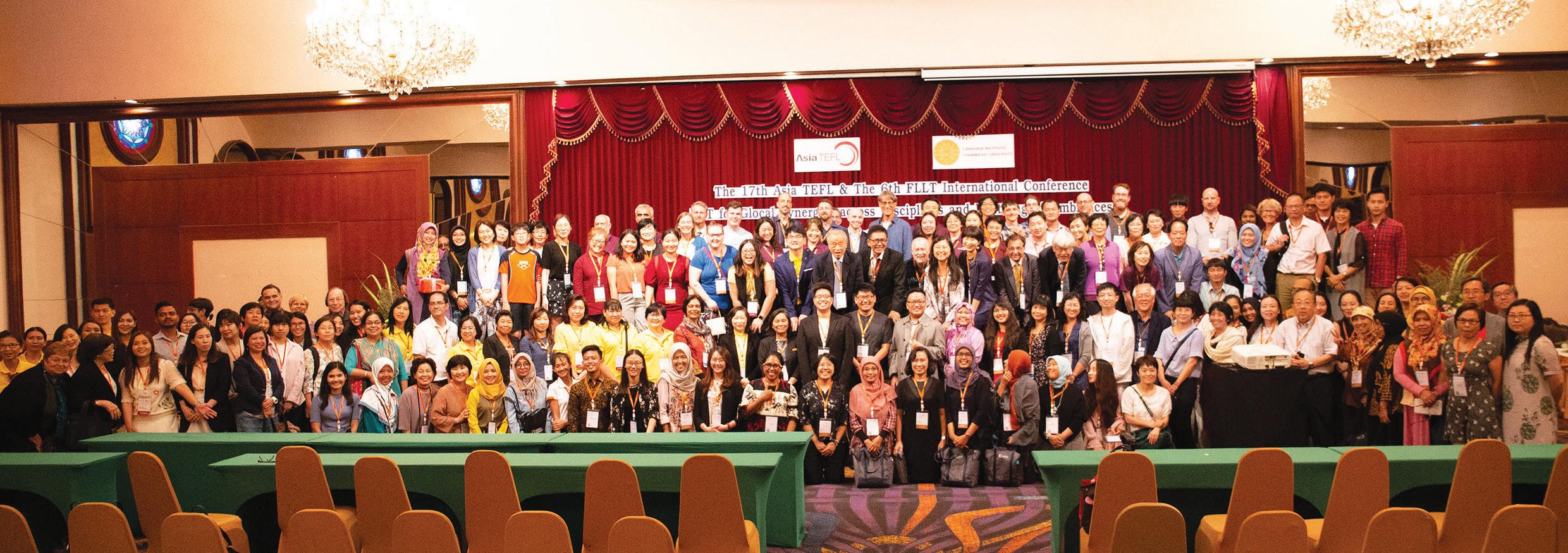
13 minute read
Episode 35 음식 배달 (Food Language Teaching: Organizing a Teaching Conference
Organizing a Teaching Conference
AsiaTEFL 2020 Comes to Korea
Advertisement
Interview with Dr. Park Joo-Kyung
AsiaTEFL is a large organization of English professionals involved in the field of teaching English as a second or foreign language throughout Asia. Its member countries stretch from Southeast Asia, to South Asia, to the Middle East, and to the Far East. It has held an annual international conference since 2003. These international conference venues shift from country to country annually, and this year the conference is back in Korea. The AsiaTEFL 2020 conference chair is Dr. Park Joo-Kyung of Gwangju. She is a long-time director of AsiaTEFL and a former president of Korea TESOL as well as of its Gwangju-Jeonnam Chapter. The Gwangju News connected with Dr. Park to find out more about the conference and about how one goes about organizing a major conference with hundreds of presentations and many more hundreds of participants. — Ed.
Gwangju News (GN): Dr. Park, you are a professor of English here in Gwangju. Let’s start off this interview with you telling our readership a little more about yourself. Dr. Park Joo-Kyung: First of all, thank you for having me. I am a professor in the Department of English Language and Literature at Honam University. I have been teaching there since 1995 after teaching at Chonnam National University for two years. My teaching and research interests include teacher education, teaching English as a lingua franca, and critical pedagogy. I have been involved with the Gwangju International Center (GIC) for many years in different capacities, including GIC Talk guest speaker, GIC Citizen’s Choir, and GIC board member. Gwangju is my fourth home, following Incheon, Seoul, and College Station, Texas, in the U.S.; but it is where I have lived the longest. I am very happy and grateful to be part of this great city where I have gotten to know so many wonderful people such as Dr. Shin Gyonggu, the GIC director, and Dr. David Shaffer, chairman of the GIC board, to name just two. We have been friends and colleagues for 27 years. I also feel so blessed because the city of Gwangju has given me so many opportunities to develop personally and professionally.

GN: You have been chosen as the conference committee chair for AsiaTEFL 2020. How did this come about? Dr. Park: This past April, I got an emergency call from AsiaTEFL president, Dr. Jeon Ji-hyeon. She asked me to take over as the conference chair for AsiaTEFL 2020 because the designated conference chair could not continue for personal reasons. Let me first tell you what AsiaTEFL is. AsiaTEFL stands for the Asian Association of Teachers of English as a Foreign Language. It was founded in 2003 by Dr. Lee Hyo-woong of Korea Maritime University and supported by many other organizational leaders in many other Asian countries. It has about 18,000 members and hosts an annual international conference that attracts more than 1,000 participants each year in different venues around Asia. Since its foundation, I have served AsiaTEFL as its first general secretary, as chair of AsiaTEFL 2011, as conference executive director, and as both a featured
and plenary speaker. I also have numerous international conference organizing experiences with other Korean English language teaching associations and my university as well. I knew it would be a challenge to take on the job in the middle of the conference preparations, but trusting in support from my AsiaTEFL friends and colleagues, I accepted without much hesitation.
GN: How much work goes into organizing an international conference with a thousand or more participants? What kinds of things need to be considered in properly organizing such a huge conference? Dr. Park: Organizing an international conference the size and scale of AsiaTEFL conferences requires a huge amount of work throughout the whole period of conference preparation, which lasts for more than a year. There are two kinds of work: work with people and work with papers and materials. Work with people refers to interacting with diverse groups of people at different stages of organizing a conference. This year, about 1,200 presentation proposals have been submitted and 839 of them have been accepted. We expect to have more than 500 presenters and 800 participants online and in person. Work with papers and materials refers to creating, publishing, and disseminating documents and conference materials, including the call for presentations, conference posters, conference promotional videos, a conference program, a program book (both print and digital), certificates, receipts, and so on.
By the way, this year’s conference theme is “Interweaving Theory and Practice in ELT in Asia: Creating New Prospects for the Future.” The conference will be held both online and in person at the KINTEX Convention Center in Goyang, just north of Seoul, on November 27–29. We have a great speaker lineup with 13 keynote, plenary, and featured speakers. Very fortunately, we received grants from the Korean National Research Foundation and the Korea Tourism Organization for hosting AsiaTEFL 2020. But most importantly, we have a great team for our conference organizing committee. This is a needed bonus because as AsiaTEFL 2020 is a hybrid conference with both virtual and in-person presentations, the organizational difficulty will be doubled.
GN: With this year’s AsiaTEFL Conference occurring in the time of COVID, what particular problems did the pandemic throw at you and what is being done to overcome these added difficulties? Dr. Park: Due to the fluctuating state of COVID-19 both inside and outside of Korea, we have had to change our plans several times regarding the conference hours and dates, conference mode, and presentation methods most of all. In order to resolve the current traveling difficulties and cope with the needs of all the participants who are from different parts of the world and in different time zones, we have made very important changes and decisions to our conference: First, having slightly moved our conference times and dates to improve Asia-wide participation, the conference sessions are from 1 to 9 p.m. on the first two days and from 10 a.m. to 6 p.m. on the last day, both online and at KINTEX. Second, all presenters not in Korea are to present online only. Those in Korea may present either online or in person. Third, the presenters’ video files and PowerPoint files will be provided to registered conference attendees up to one month after the conference. Fourth, AsiaTEFL has created a registration fee waiver for presenters who have experienced severe hardship in this time of the COVID-19 pandemic.
GN: The conference will be held both online and onsite. Please explain how this will work. Dr. Park: There are three presentation methods in this hybrid conference: presenting online, either synchronously or asynchronously, and presenting in person. As I mentioned before, all presenters not in Korea are to present online only, and those in Korea can choose to present online or in person. All plenary and featured sessions are to be delivered synchronously and will be live-streamed. Opening and closing ceremonies along with some cultural performances such as the hwagwanmu (화관무, corolla dance) and K-pop dances will be held live in the main hall of KINTEX and streamed for online viewers. It is a very complicated and demanding undertaking for us to deal with hybrid conferencing for the first time.
GN: As this is to be one of Korea’s premiere high-tech conferences, what types of unexpected things can the participants, both online and onsite, expect to experience? Dr. Park: Selected as a promising international conference for growth in the Korea Tourism Organization’s Meeting Technology competition, AsiaTEFL 2020 will be introducing diverse technologies including hologram telepresence, an MC robot, virtual presentations, AR/ VR, and a smart chatbot. Participants will meet some of the plenary speakers through hologram telepresence and see the AsiaTEFL human MC emceeing with a robot. Without a doubt, it will be a most memorable conference despite the pandemic.
GN: Korea TESOL is collaborating with AsiaTEFL this year in organizing the conference. How did this come about and what benefit does it have for Korea TESOL members? Dr. Park: As a former president of Korea TESOL, I am very happy to see two of my favorite organizations become partners and work together for one goal: to host a successful conference and grow both associations. For its part in the collaboration, AsiaTEFL provides Korea
▲ Closing ceremony photo at AsiaTEFL 2019 in Bangkok, Th ailand.

TESOL members conference registration at the same low rates as for Asia TEFL members, as well as a free, oneyear AsiaTEFL membership, and scheduling preferences for Korea TESOL presenters.
GN: Why should English teachers in Gwangju and Jeollanam-do, as well as the rest of Korea, be interested in attending AsiaTEFL 2020? Dr. Park: AsiaTEFL 2020 will be at a unique venue for English teachers in this region and around the country to realize the goal of helping learners acquire communicative competence in English and become global citizens. Our plenary speakers – Dr. Paul Matsuda, Dr. Azirah Hashim, Dr. Kim Tae-Young, Dr. Nick Saville, Dr. Christine Coombe, and Dr. John Norris – will inspire and empower them with their intercultural experiences and expertise. Th e conference will be the largest venue in Asia for participants to engage in dialogue and exchange ideas with others from all sectors of English teaching and learning in more than 30 diff erent countries. In particular, we are planning a roundtable for Asian teachers of English with elementary and secondary school teachers as panelists from half a dozen diff erent countries in Asia.
GN: Lastly, what would you like to say to the readers of the Gwangju News? Dr. Park: Th e lyrics to the AsiaTEFL Anthem include the following: “We teach a global language to open doors to new opportunities, knowledge, and the world. / With our grip on our traditions, we stand fi rm on our native ground. / We come from diff erent lands, but we are one in a circle of dedicated professionals. / We are gathered here to forge strong links, broaden horizons, share our lives, / Become the best teachers we can be, and open pathways through this universe. / In the air, we hear a vibrant harmony, the sound of people united for one goal: / Peace through friendship, knowledge, prosperity, in AsiaTEFL we will grow.” Gwangju News to AsiaTEFL and to AsiaTEFL 2020. Early-bird registration is Sept. 15 – Oct. 25. Regular preregistration is Oct. 26 – Nov. 20. Please do not miss the opportunity to be part of this wonderful organization and its conference. For further information, please visit the AsiaTEFL website at www.asiatefl .org or the conference website at www.asiatefl 2020.org .
GN: Th ank you, Dr. Park, for introducing this exceptional conference-going opportunity to our readers and for your integral role in organizing it!
Photographs courtesy of Dr. Park Joo-Kyung.
GWANGJU-JEONNAM KOTESOL UPCOMING EVENTS
Check the Chapter’s webpages and Facebook group periodically for updates on chapter events and online activities.
For full event details:
The Interviewer
David Shaff er is an executive member of both AsiaTEFL and Korea TESOL with years of conference organizing experience with both associations. He encourages all English teaching professionals to take part in this upcoming conference opportunity. As vice-president of the Gwangju-Jeonnam Chapter of KOTESOL, Dr. Shaff er invites you to participate in the teacher development workshops and their regular meetings (in-person and online). He is currently the chairman of the board at the Gwangju International Center as well as editor-in-chief of the Gwangju News.
Book Review 53 e Man ey Wanted Me to Be: Toxic Masculinity and a Crisis of Our Own Making
Iwas surprised to learn, not that long ago, that November 19 is International Men’s Day: a day to focus on men’s health, improve gender relations, highlight male role models, and promote positive expressions of masculinity. Much earlier this year, I had asked a male colleague to recommend male feminist authors. His fi rst recommendation was Jared Yates Sexton’s Th e Man Th ey Wanted Me to Be: Toxic Masculinity and a Crisis of Our Own Making. I thought it was a great fi t for the IMD mission statement. Also, it is a mustread for anyone wishing that the current sociopolitical climate (especially in North America) were diff erent for both men and women.

Th is book is part memoir of a poor white boy forgotten by his father and part cultural analysis of a forgotten American town left behind by the rapid shift to a digital, globalized economy. In his childhood, Sexton’s grandfather provided one shining example of positive masculinity in a world ruled by male tyrants and submissive women. But his grandfather’s kindness and opposition to accepted male behavior was not enough to save Sexton from an adulthood fueled by alcohol and depression. On the edge of suicide, he reluctantly agreed to see a therapist and, over the course of many years of continued therapy, study, and introspection, he wrote this book to highlight white patriarchal masculinity and how it is failing everyone. Especially for those that have been forgotten by the powerful, it is a lie that is contradictory and dangerous to the world.
I sympathized greatly with Sexton. When he wrote about growing up diff erent in a small town and discovering the internet, it felt like he was writing about my adolescence. Th e internet in the 1990s acted as a gateway to safe havens where strangers could gather and talk about their hobbies without fear of the consequences they would have faced in the outside world. As someone who also grew up in a small town with a lot of unique and interesting hobbies, this deeply resonated with me.
Sexton goes back and forth a lot between telling his personal story and recounting how it fi ts into the larger socio-political picture of the USA in the 2010s leading up to the 2016 election. Th e book is divided into conventional chapters and more or less follows a linear narrative, beginning in childhood and moving forward until it
By Jared Yates Sexton
Reviewed by Kristy Dolson
reaches Sexton’s current state. It is written in a very intimate and personal tone – solemn but hopeful – purposefully constructed to make the author vulnerable as a model to others who may also be seeking to break the cycle of toxic masculinity. Th e conversations he had with his loved ones are candid and moving. He supports his experiences and opinions with studies and research that are referenced at the end of each chapter to encourage readers to do further research on their own.
Th is whole book acts as a lightning rod for toxic white masculinity. Sexton lays out what it is and what it generates when left unchecked. As a journalist who carefully followed the 2016 election campaign, he felt it was necessary to counter the growing unrest and violence that swept over America in the run up to and election of Donald Trump – a man who fueled and enabled the worst aspects of toxic male culture. Th ose internet trolls who only felt safe to unleash their hatred from behind a screen – Trump gave them the legitimacy they craved to air their opinions in the broad light of day. I sincerely hope that Joe Biden is elected in November. Biden is a man like Sexton’s grandfather – old and white and male – but unlike Trump, he shows compassion and demonstrates a willingness to change that benefi ts more than the one percent.
Regardless of who wins the presidential election this month, change is made by taking many small steps over time. For Sexton, it took years, and it will take years more to see greater change in society – if any at all. Since November is the month to highlight positive male role models, I submit Jared Yates Sexton and his story of personal and cultural struggle. I hope it inspires more people to make change in their own thoughts and lives.
The Reviewer
Kristy Dolson lived in South Korea for fi ve years before taking a year off to travel, read, and spend time with her family in Canada and
Australia. She holds a Bachelor of Education and teaches at the new Jeollanamdo International Education Institute.










